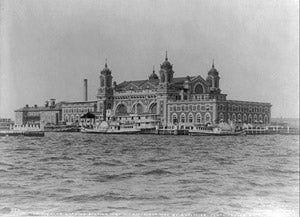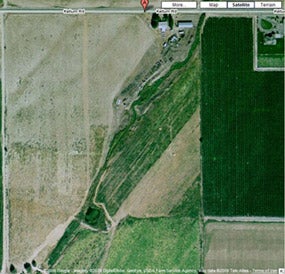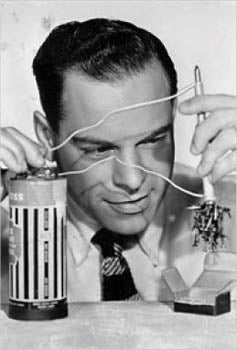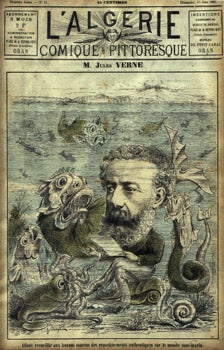Cast of Heroes
 Charles Cuthill Dunbar, Bonnie's grandfather, first enters the United States through the receiving station at Ellis Island.
Charles Cuthill Dunbar, Bonnie's grandfather, first enters the United States through the receiving station at Ellis Island.
Exhibiting her trademark modesty, Dunbar insists she's no hero for weathering trials
on the ranch and skyrocketing into orbit. But she's quick to point out the heroes
in her own life. One such character was Dunbar's late grandfather, whom she knew
until the age of 92.
Charles Cuthill Dunbar could fiddle with the best of them, mastering Scottish folk
tunes by ear. His granddaughter still envies his musical skills, but never followed
his lead. "I don't have the talent," she says chuckling, remembering the violin he
once gave her.
 The cattle ranch, a few miles outside of Outlook, Washington is shown from space. Here, the Dunbar children work the fields and develop a work ethic second to none.
Google - Imagery photo.
The cattle ranch, a few miles outside of Outlook, Washington is shown from space. Here, the Dunbar children work the fields and develop a work ethic second to none.
Google - Imagery photo.
A century ago, Charles Dunbar chased the American dream at the tender
age of 19. He was one of many immigrants with his heart set on a new life as he
passed through New York's famous Ellis Island a century ago.
After arriving in America, Charles broke horses in upstate New York, near Syracuse.
In due course, he realized his dream homesteading in Condon. (The Scot met and
wooed his wife Mary West, a Scotswoman, at a Portland baseball game.) His resolve
and honor aren't lost on Dunbar. He was, "never one to take charity or point fingers,"
she says admirably. The self-educated elder held himself accountable - come what
may.
As children often do, Bonnie considers her parents her most influential mentors,
admiring them for their tenacity on the cattle ranch and for practicing what they'd
preached. Bob and Ethel didn't expect their children to be astronauts. But they
insisted the next generation of Dunbars use their "God-given talents and lead good,
productive lives".
Bob Dunbar grew up the middle son of three brothers in the small town of Condon
where his parents homesteaded. He turned down a scholarship to Oregon State University
so he could enter the Marine Corps and fight in World War II. He knew all about
being productive.
When the war ended, the hard work didn't. Bob took on a sizable property five miles
or so from Outlook, Washington. It was desert land - dry, full of the region's widespread
sage brush, and rocky. Showing a doggedness Dunbar respects, Bob made a cattle ranch
on that land, a farm, and a life - raising his four kids there with his longtime
wife of 57 years, Ethel, by his side.
 The Russian satellite Sputnik, shown above, is ready to launch into space and change the world. As the historic moment unfolds, a nine-year-old Bonnie Dunbar hunts for the satellite in the skies and starts to dream big.
NASA photo.
The Russian satellite Sputnik, shown above, is ready to launch into space and change the world. As the historic moment unfolds, a nine-year-old Bonnie Dunbar hunts for the satellite in the skies and starts to dream big.
NASA photo.
Raised one of nine children in Havre, Montana, Ethel Dunbar was visiting her sister
in Condon when she met her future mate. And as they say, the rest is history. Bob
and Ethel married on June 17, 1948. It was the beginning of nearly six decades together.
In 2005, Bob Dunbar died at the age of 83..
Dawn of the Space Age
In the beginning, space found Bonnie Dunbar and Bonnie Dunbar found space. It happened
one October night when she was all of eight. "Sputnik" astonished the world and
gave the former Soviet Union bragging rights for sending the first human-made object
to space.
Dunbar remembers following her parents outside and scanning the vast Eastern Washington
skies for traces of the small satellite. "People tuned in to their radios listening
for the beep, beep, beep," she recalls.
And so The Space Age began. For Dunbar, a world far from Outlook began to take hold.
Journey to the Final Frontier
While other kids tuned in religiously to the Mickey Mouse Club and American Bandstand,
Dunbar read voraciously. She flipped through encyclopedias and placed herself in
the science fiction stories of Jules Verne, popular English author H.G. Wells, and
Arthur C. Clarke who wrote Dunbar’s all-time favorite short story, The Star. In
fact, years later, it was childhood reading that helped her tune out dissenters
who thought a young woman of the 60s had no business aiming so high.
 The avuncular Don Herbert, popular TV
star of Mr. Wizard, inspires Dunbar's passion for science.
The avuncular Don Herbert, popular TV
star of Mr. Wizard, inspires Dunbar's passion for science.
 Godfather of Science Fiction Jules Verne is a Dunbar favorite.
Godfather of Science Fiction Jules Verne is a Dunbar favorite.
"As a child, I read all the time," says Dunbar. "I learned through biographies that
we all face obstacles and people who doubt we can succeed. People who are successful
learn to ignore them and stay focused on reaching their goals."
Always one to follow sound advice, Dunbar excelled in school and predictably loved
science. She has fond memories of "Mr. Wizard" – the phenomenally popular science
star who debuted on national television in 1951. The avuncular Don Herbert introduced
boys and girls to the wonders of science. "When I was growing up, young people were
encouraged to study science because The Space Race was on," says Dunbar. "The fact
that I was a girl, never came up."
In the Dunbar household, the four inquisitive children learned to reach for their
dreams and to appreciate culture. Never having the opportunity to go to college
themselves, Bob and Ethel wanted more for their children. "Education was a gift,"
Dunbar says. There were always books in the house. The children were exposed to
classical music and Dad was active in the local theater.
Even as a model scholar, Dunbar juggled a wide range of extracurricular activities
growing up. She made the debate team and the Honor Society, became a cheerleader,
and was voted most athletic girl in her class. "I wanted to be everything I could
be,” says Dunbar.